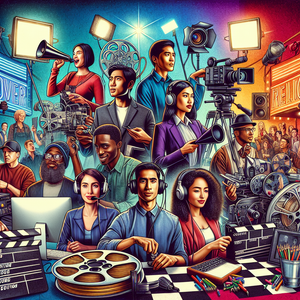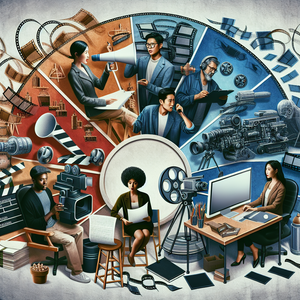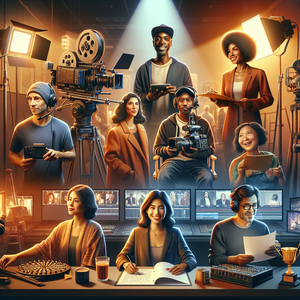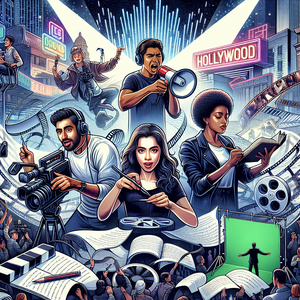
Unveiling 15 Essential Career Paths in the Film Industry: From Production to Post-Production
The film industry is a vibrant and ever-evolving landscape filled with diverse career opportunities that extend well beyond the iconic roles of actors and directors. A closer look at the industry reveals a wealth of positions that not only promise stability but can also be quite lucrative. From the imaginative realms of production design and scriptwriting to the intricate technicalities of sound engineering and film editing, each role contributes significantly to the cinematic experience. Moreover, behind-the-scenes positions, such as production assistants and coordinators, are vital for ensuring that productions run seamlessly. Exploring these varied job titles and the skills they require is crucial for anyone aspiring to enter the film world. While some positions offer more consistent employment, often linked to the demands of production companies, others provide freelance opportunities that can lead to a more unpredictable career. Below, I present an in-depth look at 15 key roles within the film industry, showcasing their responsibilities, requirements, and impact on the filmmaking process. This guide aims to equip you with the insights needed to navigate your future in this dynamic field.
Job Summaries:
Production Designer:
- Imagine crafting the visual world of a film.
- As a production designer, you collaborate with directors and cinematographers to create sets and select locations that embody the film's essence.
- A degree in fine arts or design is typically required, along with a portfolio that showcases your artistic vision.
- Your work sets the stage for the storytelling that unfolds on screen.
Sound Designer:
- Think about the last film you watched—what held your attention?
- Often, it’s the sound.
- Sound designers are responsible for creating the auditory experience, from sound effects to dialogue and music.
- A degree in sound engineering is common, and proficiency in editing software is essential.
- Your work adds depth and emotion, guiding the audience’s feelings throughout the film.
Film Editor:
- The magic of storytelling comes alive in the editing room.
- Film editors piece together raw footage into a cohesive narrative.
- A bachelor’s degree in film or a related field is usually recommended, along with experience in editing software like Adobe Premiere.
- Your keen eye for detail and storytelling shapes the film's rhythm and emotional cadence.
Cinematographer:
- As the director of photography, a cinematographer captures the visual narrative using advanced camera techniques and lighting.
- This role demands a deep understanding of camera technology and artistic flair, often backed by a degree in cinematography.
- Your expertise is pivotal in aligning the film’s visual style with the director’s vision.
Production Assistant (PA):
- Starting your journey in film often means being a production assistant.
- PAs support various departments by managing equipment setups and schedules.
- While formal education isn't always required, a passion for film and strong organizational skills are key.
- This entry-level position is a valuable stepping stone for aspiring filmmakers.
Line Producer:
- The line producer ensures that the film's operations run smoothly.
- Managing budgets and schedules.
- Strong organizational skills and prior experience in budgeting are essential.
- Often supported by a degree in film production or business.
- Your role is crucial for maintaining production efficiency.
Assistant Director (AD):
- Working closely with the director, the assistant director organizes the shooting schedule and oversees the cast and crew.
- Strong leadership and communication skills are vital, along with practical film production experience.
- A degree in film or theater can be beneficial, helping maintain an orderly set environment.
Script Supervisor:
- Continuity is key in filmmaking.
- The script supervisor plays a critical role in tracking details from dialogue to props.
- Strong attention to detail and organizational skills are necessary.
- Production experience is important.
- Your meticulous work ensures coherence during the editing process.
Casting Director:
- The casting director is instrumental in selecting the right talent for a film.
- This role requires strong interpersonal skills and an eye for performance.
- A background in drama or film studies can be advantageous.
- Your choices significantly impact the film's credibility.
Location Manager:
- Finding the perfect backdrop for a scene is the job of a location manager.
- They scout and secure filming locations, managing logistics and permits.
- Strong negotiation skills and an understanding of the production process are crucial.
- Experience in location scouting ensures that settings enhance the narrative.
Sound Mixer:
- In the post-production phase, sound mixers are tasked with balancing audio elements.
- This role requires a solid grasp of audio technology.
- A degree in audio engineering is often necessary.
- Your expertise ensures that the film's sound is clear and impactful.
- Sound mixers create an immersive viewing experience.
Costume Designer:
- Costume designers create clothing and accessories that reflect characters' personalities and the film's aesthetic.
- Creativity, attention to detail, and knowledge of fashion history are essential.
- A degree in costume design is often supported.
- Your contributions are vital for bringing characters to life on screen.
Visual Effects (VFX) Artist:
- VFX artists enhance or transform footage with digital effects.
- Proficiency in specialized software is required.
- A strong artistic vision is necessary.
- A degree in digital media or animation can be beneficial.
- The work adds a layer of visual magic.
- VFX is an indispensable part of modern filmmaking.
Scriptwriter:
- Scriptwriters are the architects of film narratives.
- They craft stories and dialogue that captivate audiences.
- Strong writing skills and creativity are essential.
- A degree in writing or communications is often preferred.
- Their work lays the foundation for the entire production.
Marketing Coordinator:
- Once a film is complete, marketing coordinators step in to develop promotional campaigns.
- Strong communication and organizational skills are necessary, along with experience in marketing strategies.
- A degree in marketing or communications is often favored.
- Your efforts are essential for ensuring the film reaches its intended audience.
These roles exemplify the rich tapestry of career paths available in the film industry, each offering a unique contribution to the creation of cinematic art. If any of these positions resonate with you, consider exploring current job openings and taking the next step toward your dream career in film. Additionally, researching industry trends, including job growth and average salaries, can provide valuable context for your choices. Engaging with professionals in the field and pursuing internships can also yield insights and networking opportunities. The film industry is vast and continuously evolving—your perfect role may be just around the corner!
Explore More Jobs

